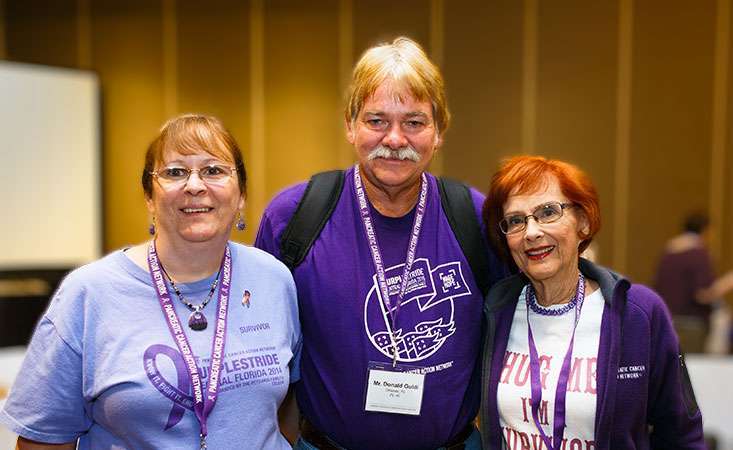
Barb Nehr, far right, PanCAN Advocacy Chair in Central Florida, at PanCAN’s Advocacy Day 2018, with fellow survivor Crystal Guldi and Crystal’s husband, Donald.
Editor’s note: National Cancer Survivors Day was June 7, 2020. All week long we’re featuring inspiring stories of survivors nationwide. We celebrate all pancreatic cancer survivors, whether they were diagnosed today or have lived with the disease for years.
Today’s story is contributed by Barb Nehr, volunteer Advocacy Chair with our Central Florida Affiliate. She posted this on her Facebook page in April, in celebration of 10 years of survival:
I was diagnosed with pancreatic cancer in early 2010.
Routine blood work had revealed elevated liver function numbers, and I immediately suspected a link with the severe itching I had been experiencing and the slight jaundice that was developing. I began to attach significance to clay-colored stools and dark amber urine, other clues to which I had paid little attention.
My primary care physician ordered more tests and my husband, Adam, fearing the worst, researched my options for treatment. We all knew enough about pancreatic cancer to understand that time was of the essence.
Cancer was prevalent in my maternal family, including an uncle who had passed from pancreatic cancer.
For some unknown reason, I was not afraid; I felt that I would survive.
I was eligible for the Whipple procedure, which was performed at the Mayo Clinic in Jacksonville, Fla. It was a laparoscopic procedure and I was back home in six days.
My surgery was followed by a combined treatment of radiation and Xeloda, which lasted for six weeks, and then a chemotherapy regimen of Gemzar, which had to be modified because of my low platelet counts. All of these treatments were performed at the Cancer Center at Orlando Health.
In conjunction with the Gemzar I incorporated into my treatment genistein, an over-the-counter soy isoflavone, that had performed well in clinical trials by enhancing the effectiveness of the Gemzar.
Studies had shown potential benefit with minimal side effects; my oncologist agreed it was worth a shot and we consulted the primary researcher for dosage. I continue to take low levels to this day, and I have shown no evidence of disease since then, although my CA 19-9 has never returned to normal levels.
(Editor’s note: It is critical that you always speak with your healthcare team prior to incorporating any new treatment substance. Genistein is not FDA-approved for use in combination with Gemzar to treat pancreatic cancer, and individuals may respond differently. Your doctor can advise regarding potential benefits, risks, etc.)
My healthcare team currently consists of my surgeon, now with the Miami Cancer Institute, my oncologist at Orlando Health, my cardiologist, gastroenterologist, endocrinologist, and primary care physician.
I make certain they are all aware of all testing ordered by the other team members, and I am thankful to have each of them in my corner.
They also all know of my activism with the Pancreatic Cancer Action Network (PanCAN) and have given me much encouragement. I love them all!
Benefits of Volunteering
Because everything happened so quickly after my diagnosis, I wasn’t aware of PanCAN until months after my last chemo ended. My husband suggested that I become involved and, after my first volunteer meeting, I was hooked.
While I am not much of a fundraiser (my father was the family salesman), I felt I could contribute something.
Through volunteering with PanCAN, I have had opportunities to meet and get to know many of our dedicated researchers. While I won’t claim to fully understand the direction of their research, I am awed by their dedication. These men and women are my heroes and I am very fortunate to say I know them.
I count this as one of the greatest benefits of my volunteering.
Importance of PanCAN’s Advocacy Week (June 15-19, 2020)
I serve as the volunteer Advocacy Chair for PanCAN’s Central Florida Affiliate.
Meeting our elected officials and/or their staff in offices both local and in Washington, D.C., at PanCAN’s Advocacy Day has given me an opportunity to tell my story and to emphasize the importance of research in ending the ravages of a cancer that is lethal to so many and destroys families so quickly that they may have no time to adjust to the realities.
This year’s Advocacy Week will be different and challenging, with the COVID-19 pandemic and the social and economic turmoil we are experiencing.
Nonetheless, all this really means is that we need to work that much harder to make sure our message is heard.
Our strength is in our numbers; the more people who get involved, the less chance there is of our being ignored. We will prevail this year as we unite to have our voices heard.
I hope you’ll join me starting Monday, June 15, for a week of important advocacy activities.
We have the means to succeed and together, we can.
Any treatments mentioned in this story may not be appropriate or available for all patients. Doctors take many things into account when prescribing treatments including the stage and type of cancer and the overall health of the patient.















